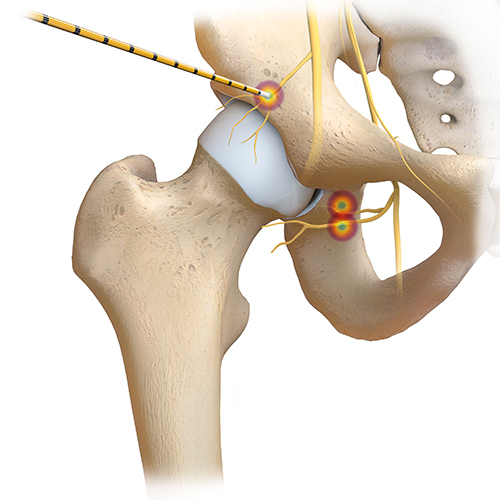What Is Joint Denervation?
Joint denervation is a procedure that disables the small sensory nerves responsible for transmitting pain from the joint.
This can be done using either heat (radiofrequency ablation) or cold (cryoablation).
The goal is to reduce pain, though the procedure does not repair the joint or reverse joint degeneration (e.g. osteoarthritis).
However, patients often experience mild improvement in mobility, as the reduction in sharp, sudden pain allows the surrounding muscles to function more efficiently.
When Is Joint Denervation Recommended?
This procedure is designed for patients with advanced osteoarthritis of the hip, knee, or shoulder, particularly when:
- Joint replacement (arthroplasty) is not an option due to other medical conditions
- The patient declines surgical treatment
- The patient already has a joint prosthesis, but continues to suffer from chronic pain
When Is the Procedure Contraindicated?
- Local infection at the site of the injection
- If a prior diagnostic nerve block fails to produce at least 50% pain relief for a few hours
How Is Hip Joint Denervation Performed?
- The procedure is performed under ultrasound guidance in an outpatient clinical setting.
- Duration: approximately 45 minutes
- Afterwards, the patient rests for about 30 minutes and then may go home, accompanied by an adult.
Sedation
- Most denervation procedures are carried out under conscious sedation, so the patient does not experience discomfort.
- The physician numbs the skin with local anesthesia, then guides a needle to the targeted nerve branches and applies either radiofrequency heat or cryoablation to disable them.
What Happens After the Procedure?
- Mild increase in pain is possible for a few days following the treatment.
- Full therapeutic effect may take up to 7 days to develop.
- In most cases, no additional pain medication is necessary.
- Patients can resume normal activities the next day.
How Can Patients Support Recovery?
Physiotherapy is strongly recommended for all degenerative joint conditions, including osteoarthritis of the hip, knee, and shoulder.
Rehabilitation exercises can maximize the benefit of the procedure by improving joint function and muscle strength.
Pre-Procedure Instructions
Patients taking blood-thinning medications such as:
- Coumarin
- Warfarin
- Plavix
- Heparin
- Fragmin
- or similar anticoagulants
…should inform their doctor well in advance, as these increase the risk of bleeding.
Do not stop any prescribed medication on your own. Always consult your physician before making any changes.
More preparation instructions can be found here: https://fajdalomklinika.hu/en/for-patients/
Possible Risks and Complications
Although generally safe and low-risk, hip joint denervation may cause the following complications:
- Pain at the injection site
- Inflammation
- Infection (e.g. abscess)
- Bleeding
- Hematoma (localized internal bleeding)
- Nerve injury
- Allergic reactions
In the event of any complications, patients may contact the clinic within 24 hours after the procedure.
For urgent medical issues, please visit the nearest emergency department.



